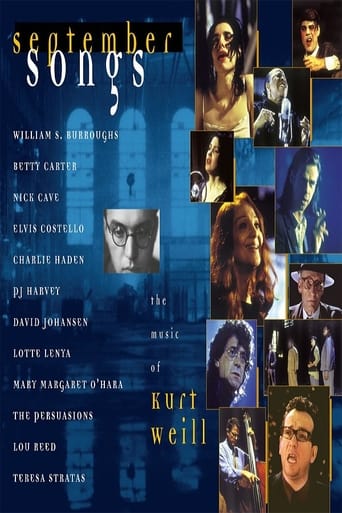A Rahne
I wish I could find this on DVD, I saw it in 1995 when it was shown on public T.V. and was blown away. The choice of musicians for the individual songs is masterful. Nick Cave gives a deliciously creepy take on Mac The Knife, Elvis Costello breathes a wavering pathos into Lost in the Stars, and Charlie Haydon's Speak Low is one of the few instrumental pieces that can bring me to tears. The CD is available on Amazon.com and I highly recommend it. I would comment on the ignorance of the user who complained about this being about "some German guy" but its obvious that person was far out of his depth musically and culturally.
Chris Barry
I actually owned this on video for three years before watching it. Somehow, I just didn't get around to it. What was I thinking? I read some reviews of it, most were either mediocre or sneering and I thought the work would be a lame shot on video CBC doc with some talking heads explaining (duh) why they think Kurt Weill is a musical genius.Then I watched this film and WOW! First of all, it's not a documentary! It's a concert film with amazing renditions of Weill's music by luminaries such as Nick Cave, William S. Burroughs(!), Lou Reed, Mary Margaret O'Hara, David Johansson, Elvis Costello and P.J. Harvey, amongst others doing incredible interpretations of Weill's work.The film is interestingly staged in an old warehouse that evokes both the early industrial period in which Weill worked as well as the alienation technique of Brecht's theatre.I can't describe how wonderful this work is. If you are a Brecht purist you may find this a little too awesome, but if you have an open mind and enjoy challenging and inventive music, you must see this.What struck me so powerfully was that Weill's music never fit into what anybody would mistake as a 'musical' or 'opera' or 'pop', but amalgamated them all in an attempt to bridge art with the politics that surrounded him at the time. Weill's music was the soundtrack to the rise of Nazism in Europe and his haunting scores are even more disturbing in retrospect.LONG LIVE WEILL!
afc-ajax
This is what modern documentary filmmaking is meant to be. Neither relying on talking-head interviews nor re-enactment, "September Songs" attempts to convey the great talent, contribution, and indeed the trials of Kurt Weil's journey from pre-WWII Germany to his eminent destination, the U.S.The performances by Nick Cave, Elvis Costello, and PJ Harvey are wonderful and inflect a properly dark, dramatic tone which parallels the hard and often persecuted life of the composer.Buy the soundtrack - see the film.
whiteheaddr
I was lucky enough to see 59 out of 89 minutes of this tv film and would recommend it to anyone who is interested in the culture of Avant Garde Germany in the 1920's, the link between Weill and the American musicals genre, opera, the relationship between Weill, Bertolt Brecht and Lotte Lenya. It is a film that explores Weill's movement from Germany to America and extracts of the music he wrote in both countries from the 20's to 1950. The film shows an eclectic cast interpreting his music and in the process revealing the atmosphere of his work and allowing the viewer to discover the relationship between the cabaret scene of Berlin in the 20's and 30's and the birth of the American musical and a connection to modern opera. Nick Cave sings his most famous song written for the "Threepenny Opera", Mack the Knife(a favourite of Frank Sinatra and many others). Lou Reed does one number,Teresa Stratas sings Youkali and another number beautifully, Elvis Costello sings "Lost in the Stars" and William S. Burroughs gives a spoken/sung rendition of "What Keeps Mankind Alive" which is pretty amazing in itself. The songs in this programme created an atmosphere that was unmistakable and I found the treatment totally sympathetic to Weill and his music. There are a number of voice overs of Lotte Lenya(Weill's wife)singing well known songs from his back catalogue and even Bertolt Brecht singing a number. It is intercut with industrial and military images from Hitler's Germany and goes on to show early footage of America. I thought the film lovingly produced and enjoyed every second of it, my only disappointment being that I did not manage to catch the whole film. The music is as compelling as you would imagine from a man was considered the equal of and collaborated with Langston Hughes, Moss Hart, Maxwell Anderson, Ira Gershwin, Bertolt Brecht and made a reputation blending classical opera, folk music and dissonant jazz. Despite the previous reviewers lack of familiarity with Weill his work has attracted interpretation by well known artists of the past and continues to do so e.g. Rise Stevens, Beatrice Arthur, Adolph Green, Gertrude Lawrence, Danny Kaye, Chita Rivera, Ann Miller, Sting, Tom Waits, Marianne Faithful, Marc Almond, The Doors, Dagmar Krause, David Bowie, Ute Lemper and so on.This is a film that uses a montage of images, voice overs, songs and music to create an understanding, it isn't a linear narrative throughout although it does explore his life in a linear representation of his movements and works. It is fascinating and poignant and is not just a film, it transcends the category and at points becomes art. The presentation on tv was accompanied by subtitles for the occasional number sung in German. The decision to do this gives the viewer the advantage of listening to the expressive qualities of the words and music with a translation to aid understanding. I cannot recommend this film highly enough.

